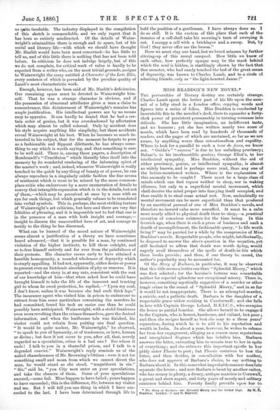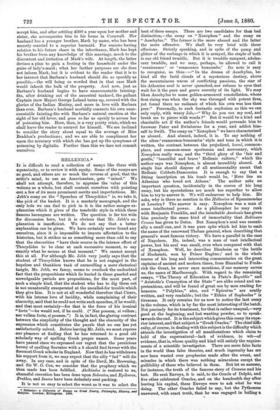MISS BRADDON'S NEW NOVEL.*
THE perversities of literary destiny are certainly strange. Charles Lamb spent the better part of his life upon the sum- mit of a lofty stool in a London office, copying words and figures into a series of folios. Miss Braddon is conducted by inscrutable fate to the novelist's desk, there to squander a forty. clerk power of persistent penmanship in turning romance into ridicule. She has little imagination, an indifferent taste, and no humour ; yet she has written nearly two score of novels, which have been read by hundreds of thousands of readers, and the pages of which are unstained, so far as we are aware, by anything worse than sensationalism and vapidity. Where to look for a parallel to such a tour do force, we know not. " Ouida's " " success " is due to her unfailing pruriency; Balzac's, to his inexhaustible genius ; George Eliot's, to her intellectual sympathy. Miss Braddon, without the aid of either pruriency, genius, or intellectual sympathy, is almoati as widely known, and is perhaps more read, than any one of the before-mentioned writers. Where is the explanation of this anomaly to be sought ? There must be a large class of minds which can find repose neither in sleep, nor in waking idleness, but only in a superficial mental movement, which shall deceive the mind proper into fancying itself occupied, and thus enable it to steal some actual rest. Now, undoubtedly no mental movement can be more superficial than that produced by an uncritical perusal of one of Miss Braddon's novels, and therefore no inward calm more unruffled. It must be a calm more nearly allied to physical death than to sleep,—a practical cessation of conscious existence for the time being. In this feverish age, when there is such a press of business and such a dearth of accomplishment, the fashionable query, "Is life worth living ?" may be parried for a while by the compromise of Miss Braddon's novels. Respectable people, who might, intellectually, be disposed to answer the above question in the negative, yet still hesitated to affirm that death was worth dying, would eagerly avail themselves of the spells of death-in-life which these books provide ; and thus, if our theory be sound, the author's popularity may be accounted for.
Of the Story of Barbara, in particular, it may be observed that this title seems a better one than "Splendid Misery," which was first selected ; for the heroine's fortune was remarkable neither for especial splendour nor exceptional misery. There is, however, something mystically suggestive of a murder or other tragic crime in the sound of "Splendid Misery," and in so fax it would be not inappropriate. There is an attempted murder, a suicide, and a pathetic death. Barbara is the daughter of a respectable grass widow residing in Camberwell ; and she falls in love with Captain George Leland, 11.E.I.C.S., who occupies the house as partial boarder. She allows herself to be engagell to the Captain, who is honest, handsome, and valiant, but poor ; and then she resigns herself as best she may to a three years' separation, during which he is to add to his reputation and wealth in India. In about a year, however, he writes to release her from her engagement, alleging as a reason some mysterious and unexplained disgrace which has befallen him. Barbara answers the letter, entreating him to remain true to her in spite of everything ; and she entrusts this important epistle to her giddy sister Flossie to post ; but Flossie contrives to lose the letter, and then decides, in consultation with her mother, who does not approve of Barbara's choice, to say nothing ID Barbara about it. In this somewhat improbable manner does fate separate the lovers ; and now Barbara is beset by another suitor, who has money in plenty, a dreary, antique mansion in Cornwall, a gaunt and stern aspect, and forty years of moody and solitary existence behind him. Poverty finally prevails upon her to
• The Story of Barbara: her Splendid Misery and her Gilded Cage. By It t. Braddon. London : J. and R. Maxwell. accept him, and after settling £300 a year upon her mother and sister, she accompanies him to his home in Cornwall. Her husband has a younger brother, Mark by name, who has been secretly married to a superior barmaid. For reasons having relation to his future share in the inheritance, Mark has kept his brother from any knowledge of this marriage, much to the discontent and irritation of Mark's wife. At length, the latter devises a plan to gain a footing in the household under the guise of lady's-maid ; what her farther purposes are she does not inform Mark, but it is evident to the reader that it is to her interest that Barbara's husband should die as speedily as possible,—the will being so worded that in that case Mark would inherit the bulk of the property. And now, just as Barbara's husband begins to have unaccountable fainting- fits, after drinking out of the ancestral tankard, the gallant Captain (now Major) George Leland turns up, covered with the glories of the Indian Mutiny, and more in love with Barbara than ever. Barbara's husband morbidly connects his own unac- countable fainting-fits with Barbara's natural emotion at the sight of her old lover, and goes so far as openly to accuse her of poisoning him. Here, then, is a very pretty crisis, which we shall leave the reader to unravel for himself. We are inclined to consider the story about equal to the average of Miss Braddon's productions ; and we are able to compliment her upon the accuracy with which she has got up the symptoms of poisoning by digitalis. Further than this we dare not commit ourselves.



































 Previous page
Previous page